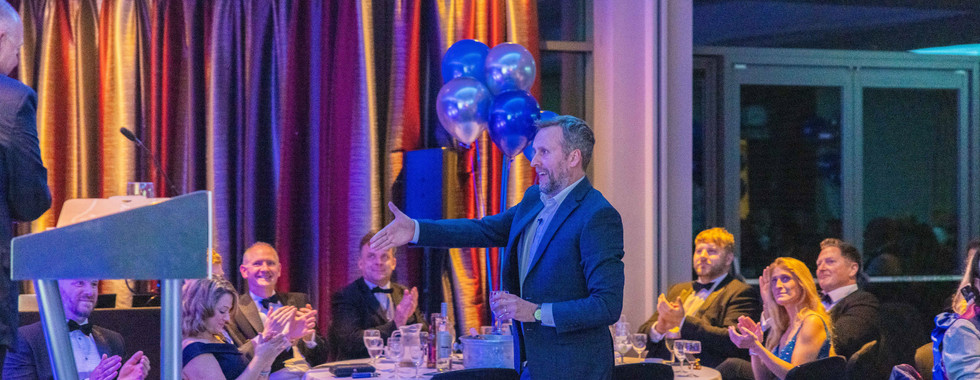Sensing in Water returns!
After a global pandemic put the brakes on Sensing in Water 2021, it’s been four years since the last instalment, and it’s fair to say Sensing in Water came back with a bang! In the ever-evolving landscape of water technology, the "Sensing in Water 2023" conference, hosted by the Sensors for Water Interest Group (SWIG), proved to be a pivotal event. This year's conference held special significance as SWIG celebrates its 30th anniversary, making it a momentous occasion for all involved. Held over two days, this biennial gathering brought together experts, innovators, and industry leaders to explore the theme of "The Data Journey: From sensor to Control Room". With a packed agenda of insightful sessions and esteemed speakers, the event delivered a great deal of knowledge and fostered valuable connections among attendees.
Day 1: Embracing Innovation
The conference commenced with Dr. Andy Nichols, SWIG Chairman, setting the stage for a celebration of SWIG's three decades of contributions to water sensing. Ian Marchant, Chairman of Dunelm Energy and Former Chairman of Thames Water, delivered the extremely well received keynote, "The Water Industry: A Journey from the Dark Ages."
Session 1, chaired by Leo Carswell of WRc, delved into cutting-edge sensors and novel technology poised to disrupt the water industry. The speakers offered a glimpse into the future of water measurement and monitoring. Nathan Lawrence from ANB Sensors discussed "Calibration-Free Measurement of pH in Demanding Aqueous Media," introducing a revolutionary approach to water quality measurement. Tom Lendrem of Badger Meter (s::can tech) shared a 25-year case study on "The Evolution of a Disruptive Sensor Technology," showcasing how innovation has evolved over time. Prof Zhugen Yang from the University of Cranfield presented a "Paper Microfluidic Device for Rapid and On-Site Wastewater Surveillance," highlighting its potential as a new tool for public health. Nick Mills from Southern Water and Rob Stevens from Proteus Instruments shared insights from "The World’s First Coastal Real-Time Water Quality Buoys," revealing key learnings from an innovative collaborative pilot project. Finally, Will Shepherd and Lenka Mudrich offered an insight into robotics and autonomy whilst discussing the development of the Pipebots robots to inspect burried water and sewer pipes. The session concluded with a thought-provoking panel discussion, encouraging cross-pollination of ideas and solutions among attendees.
Session 2, led by Matthew Ellison of Kisters, delved into advanced communications and telemetry in the water industry. Speakers in this session explored how data and technology are transforming water management. Pascal Lang and James Chapman from Xylem discussed "Drowning in Data – A Smart Catchment Approach," revealing the challenges and opportunities presented by vast amounts of data in managing water resources. Beccy O’Gorman of Ground Control explored the explosive growth and future prospects of "Satellite IoT," shedding light on the transformative potential of satellite-based technologies in water monitoring and management. Stuart Combellack from Technolog and Pearse Bradley from Northern Ireland Water emphasised the importance of "WITS" in the water industry, showcasing its significance in enhancing data interoperability. Jacqueline Diaz-Nieto of the Environmental Protection Group demonstrated how to "Put the Smart in Smart SuDs Using Instrumentation and Connectivity," highlighting the role of instrumentation and connectivity in implementing sustainable urban drainage systems. The session concluded with a lively panel discussion, driven by excellent delegate questions and panellist responses.
A Night of Celebration
In the evening, conference participants came together for a gala dinner filled with laughter and camaraderie. The entertainment, including comedian Matthew Winning and the "watery" quiz by Andy Nichols and Hannah Casswell, added an extra layer of fun. Awards were presented to Xylem's table for their quiz triumph, Hannah Gunter for winning the photography competition, and Harry Nicklin for securing victory in the early career poster competition. The night concluded with a memorable survivors' photo taken at 1 a.m., a testament to the enduring spirit of the SWIG community!!
Day 2: Looking to the future
The second day of the conference comprised another exciting lineup of sessions, this time exploring the world of data analytics and futuristic visions of water control rooms to come. Prof Francois Clemens from Delft University of Technology kicked off the day with his keynote, "Sensoring in Water: Don't Plug Yet, Pray First," offering valuable insights into the nuances of water sensing, including the difference between measuring and monitoring, and an important external view on the UK water industry.
Session 3, led by session chair Alex Gray of Thames Water, explored the role of data and analytics in the water industry. Speakers in this session illuminated how data-driven decisions are shaping the future of water management. Tom Woolley of Optimatics discussed "Smart Asset Optimization Before Capital Investment," highlighting the power of data in making optimal asset management decisions. Dr. Peter Hunter from the University of Stirling introduced "Forth-ERA," a digital observatory for environmental resilience, showcasing the transformative potential of data in enhancing environmental sustainability. Marianne Brum from Kisters emphasized real-time optimization and operational applications of integrated sensor data, demonstrating the practical applications of data-driven decision-making in water management. Lewis Richards from Microsoft explained how the power of data can be harnessed for water management, emphasizing the role of data analytics in the industry. The session concluded with a panel discussion underscoring the importance of data-driven decisions in the water sector.
Mark Webber, South West Water and W-CRF Chairman, led the final session, exploring the "Control Room of the Future." Speakers in this session delved into the innovative strides made in control room technologies and their impact on the water industry. Stephen Wigley and Armna Iqbal from Thames Water pondered whether "Less Is Really More" when it comes to the water control room of the future, delving into the intricacies of modern control room design. Rob Hutchinson from Meteomatics and Mike Everest from Meniscus discussed the incorporation of sensor data, weather data, and analytics, showcasing how advanced data integration can enhance decision-making in water management. Gregg Kennedy from Jacobs introduced "AI-Powered Predictive Analytics Using Smart Sensors," revealing how artificial intelligence is revolutionizing predictive analytics in the water industry. Peter Prater from ICCRA and Hexagon shared insights on the critical control room, highlighting its pivotal role in ensuring the efficient and reliable operation of water systems. The conference drew to a close with a panel discussion, reflecting on the innovative strides made in control room technologies and their impact on the water industry.
That’s a wrap!
"Sensing in Water 2023" not only provided a platform for the water industry's leading thinkers to share their insights but also facilitated networking and collaboration opportunities. SWIG's heartfelt thanks extended to sponsors, whose support made the event possible. As the conference concluded, participants left with enriched knowledge, new connections, and a renewed commitment to advancing water sensing technologies. The journey towards a data-driven water industry continues…
Stay tuned for more SWIG events in the near future, as the community's enduring spirit continues to drive innovation in the field of water technology. Please don't forget to leave your feedback on the event here: https://forms.gle/kWkBarxWSVGJxwYY8



















































































































































































































































Comentarios